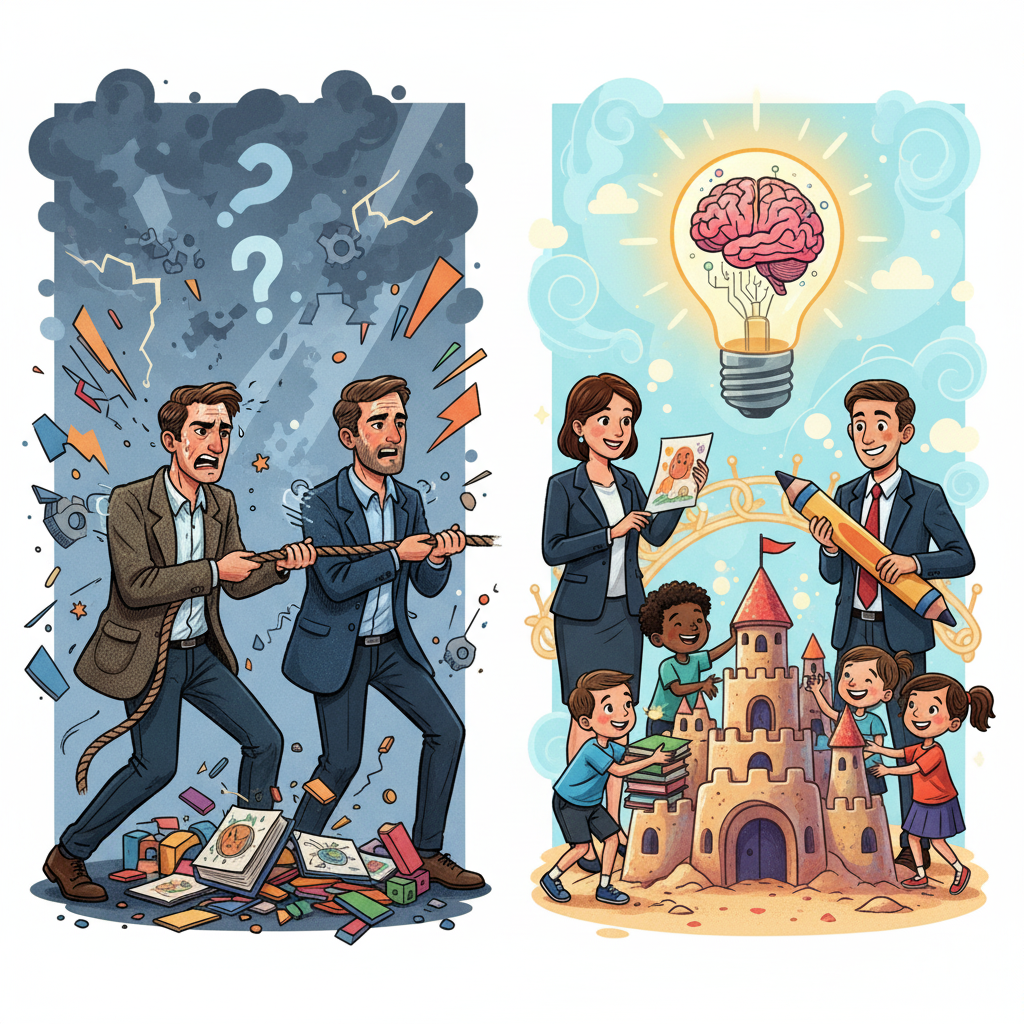Teachers and Administrators Collaboration

A Personal Reflection
This is not a judgment or a final truth, but an observation I felt compelled to share. One day, while reflecting on the patterns I saw around me, this thought struck me so strongly that I knew I had to put it into words. Writing about it became less of a choice and more of a need—like when a moment, a small scene, or even a single sentence suddenly reveals a bigger story hiding underneath. This article is simply my reflection, my way of making sense of what I notice and experience, and an invitation for others to pause and think as well.
The Playground of Education: Castles or Battles?
Education is a playground. Teachers are the kids who build creative sandcastles, shaping lessons with buckets of imagination. Administrators are the ones guarding the sandbox rules, making sure no one throws sand in anyone’s eyes. Both roles are essential, but when trust and collaboration disappear, the sandbox doesn’t look like fun anymore—it turns into a battlefield, full of toppled castles and broken shovels.
So the question is simple but urgent: how do we transform this playground into a true team sport where teachers and administrators pull in the same direction for one goal—quality education for children?
When Micromanagement Feels Like Chains on Creativity
Imagine being told exactly how to stack your blocks or the “correct” way to color your picture. That’s how it feels when teachers are over-controlled. Micromanagement turns a vibrant classroom into a grey waiting room. Teachers’ ability to innovate is stifled by rules so rigid they feel like invisible handcuffs. The result? Children lose the spark of discovery, and teachers lose the joy of teaching.
Feedback Fears: Spilled Paint and Silent Voices
Asking teachers for honest feedback without a safe, judgment-free space is like asking kids to confess who spilled the paint when you’re already holding the dripping brush. The answer will always be silence or the safest possible lie. Fear-driven schools don’t produce honest voices—they produce whispered corridors, bottled ideas, and teachers who nod but never speak.
The Invisible Burden of Overtime
Teachers don’t stop working when the bell rings. They grade essays on the sofa, plan lessons on Sundays, and brainstorm ideas in their dreams. Teaching leaks into their lives like ink spreading through paper. Yet this invisible labor is often unpaid and unrecognized, leaving teachers undervalued and exhausted. Passion, no matter how deep, should not be mistaken for free fuel.
Workshops That End Like Balloons Deflating
Professional development too often feels like a party with balloons and glittery slides—but the air rushes out the moment it’s over. Teachers sit through presentations filled with theories and buzzwords, but when Monday comes, everyone drifts back into old patterns. Workshops without follow-through are like planting seeds in dry sand—nothing grows.
Strengths and Weaknesses: A Balancing Act
Teachers bring practical wisdom, creativity, and hands-on solutions that come from living the classroom reality every day. Their weakness, if any, is limited exposure to the larger institutional constraints. Administrators, on the other hand, bring strategic vision, resource allocation, and the ability to shape policy, but they often lack direct classroom experience and lean too heavily on theory. Teachers crave freedom, recognition, and autonomy, while administrators need structured systems and aligned execution. Together, they form two halves of the same whole—yet too often, they act like rival teams instead of partners.
Collaboration: Golden Nuggets That Actually Work
One powerful way to bridge the gap is to swap roles and build empathy. Schools could host “Innovation Days” where administrators shadow teachers for a day, and teachers spend time in administrative shoes. It’s like swapping sneakers—suddenly the pinches, blisters, and pressures of each role become real. Managing twenty-five five-year-olds may look easy from a distance until you’re the one tying shoelaces while explaining fractions. Likewise, teachers often don’t see the policy storms administrators juggle until they sit in on them.
Another way is to let teachers lead committees. They know the classroom playground better than anyone else. Making them “captains” in curriculum planning and policy discussions acknowledges that their expertise matters. After all, it’s teachers who know what works and what fails when chalk hits the board.
Feedback also needs a safe home. Honest conversations can’t happen in judgment-heavy rooms. Schools should create spaces where teachers feel free to share their voices—through anonymous surveys, casual coffee chats, or even something as simple as a weekly “grown-up story time.”
Celebrating wins may sound trivial, but it’s vital. Teachers need to be recognized for creative lessons, just as administrators deserve acknowledgment for strategic victories. It doesn’t have to be grand—cupcakes, a simple thank-you note, or a shoutout in a staff meeting can go further than we imagine. Adults, like kids, thrive on gold stars.
And finally, let’s talk about fair pay. Extra hours are not “passion projects”—they’re real labor. Teachers deserve overtime pay, wellness days, or meaningful benefits for the invisible time they pour in. Otherwise, their dedication risks being mistaken for a free resource.
What Research and Experience Keep Telling Us
Giving teachers autonomy directly improves learning outcomes—students are more engaged, more motivated, and classrooms feel alive. Empathy between teachers and administrators builds trust and respect, the foundation of any functional school. And recognition—public, sincere, consistent—fuels motivation in ways that policies alone never can.
Why This Tug-of-War Matters
Teachers and administrators are not opponents. They are teammates who cover different halves of the field. Teachers handle the micro—the messy, unpredictable daily life of classrooms. Administrators handle the macro—the big-picture policies and resources. Both roles matter, but without trust and respect, the game collapses.
Final Thought: Building Castles, Not Knocking Them Down
Education isn’t just about children learning. It’s also about adults learning to collaborate. We can either spend our time knocking down each other’s sandcastles, or we can build bigger, stronger ones together.
So yes, pass the juice boxes. There’s work to be done—and the playground is big enough for all of us.


